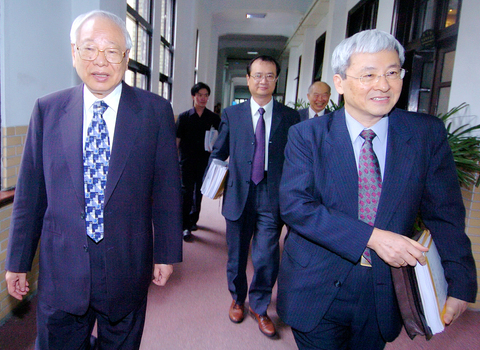Fingerprints will not be collected when people apply for their new national identification cards until the Council of Grand Justices issues an interpretation of the Household Registration Law (
Judicial Yuan Secretary-General Fan Kuang-chun (范光群) held a press conference yesterday on behalf of the council to announce the justices' decision to issue an interim order temporarily suspending the fingerprint policy until the council can rule on the matter.
According to Articles 8-2 and 8-3 of the law, applicants must provide their fingerprints when applying for the new photo ID cards, due to be issued starting July 1.

PHOTO: LIAO CHEN-HUI, TAIPEI TIMES
"We will follow the grand justices' interim order. That means the collection of fingerprints will be temporarily suspended," said Cabinet spokesman Cho Jung-tai (
Cho said those applying for the new cards will receive the old version until the grand justices issue an interpretation.
However, "If the grand justices decide that the fingerprinting policy must be carried out anyway, they will have to re-apply for the new cards and provide their fingerprints. If the justices decide against the policy, these people will still have to apply for the new cards but their fingerprints will not be taken," Cho said.
The Democratic Progressive Party legislative caucus complained that the fingerprint requirement violates both human rights and the Constitution. The caucus filed a request with the Council of Grand Justices for an interpretation on May 30.
According to Fan, 14 grand justices met yesterday morning. At around 1pm they decided to ask the Cabinet to suspend the policy.
According to Cho, there are two possible scenarios.
If the grand justices say the two articles violate the Constitution and should be amended, the law will be returned to the legislature for an amendment and new photo ID cards will not be issued before the amendment is passed.
If grand justices say the two articles are fine, then the fingerprinting policy will be resumed.
"Now that the interim order has been given, I think most people won't rush to apply for their photo ID cards, so I don't think the impact will be humongous," Cho said.
By law, every citizen older than 14 years of age must apply for a national ID card, providing their fingerprints and a new head-shot photo taken within the past six months. The photo has to be in a square format, with a white background and the face uncovered. Each of the new-format photos costs approximately NT$200.
Asked whether the government is ready to hear complaints from those who have already had their pictures taken, Interior Minister Su Jia-chyan (
"I believe that the grand justices will come up with a final ruling soon," Su said.
"In the meantime, I urge the public not to apply for the new cards before receiving an official notice from us," he said.

AGING: As of last month, people aged 65 or older accounted for 20.06 percent of the total population and the number of couples who got married fell by 18,685 from 2024 Taiwan has surpassed South Korea as the country least willing to have children, with an annual crude birthrate of 4.62 per 1,000 people, Ministry of the Interior data showed yesterday. The nation was previously ranked the second-lowest country in terms of total fertility rate, or the average number of children a woman has in her lifetime. However, South Korea’s fertility rate began to recover from 2023, with total fertility rate rising from 0.72 and estimated to reach 0.82 to 0.85 by last year, and the crude birthrate projected at 6.7 per 1,000 people. Japan’s crude birthrate was projected to fall below six,

US President Donald Trump in an interview with the New York Times published on Thursday said that “it’s up to” Chinese President Xi Jinping (習近平) what China does on Taiwan, but that he would be “very unhappy” with a change in the “status quo.” “He [Xi] considers it to be a part of China, and that’s up to him what he’s going to be doing, but I’ve expressed to him that I would be very unhappy if he did that, and I don’t think he’ll do that. I hope he doesn’t do that,” Trump said. Trump made the comments in the context

SELF-DEFENSE: Tokyo has accelerated its spending goal and its defense minister said the nation needs to discuss whether it should develop nuclear-powered submarines China is ramping up objections to what it sees as Japan’s desire to acquire nuclear weapons, despite Tokyo’s longstanding renunciation of such arms, deepening another fissure in the two neighbors’ increasingly tense ties. In what appears to be a concerted effort, China’s foreign and defense ministries issued statements on Thursday condemning alleged remilitarism efforts by Tokyo. The remarks came as two of the country’s top think tanks jointly issued a 29-page report framing actions by “right-wing forces” in Japan as posing a “serious threat” to world peace. While that report did not define “right-wing forces,” the Chinese Ministry of Foreign Affairs was

PREPAREDNESS: Given the difficulty of importing ammunition during wartime, the Ministry of National Defense said it would prioritize ‘coproduction’ partnerships A newly formed unit of the Marine Corps tasked with land-based security operations has recently replaced its aging, domestically produced rifles with more advanced, US-made M4A1 rifles, a source said yesterday. The unnamed source familiar with the matter said the First Security Battalion of the Marine Corps’ Air Defense and Base Guard Group has replaced its older T65K2 rifles, which have been in service since the late 1980s, with the newly received M4A1s. The source did not say exactly when the upgrade took place or how many M4A1s were issued to the battalion. The confirmation came after Chinese-language media reported